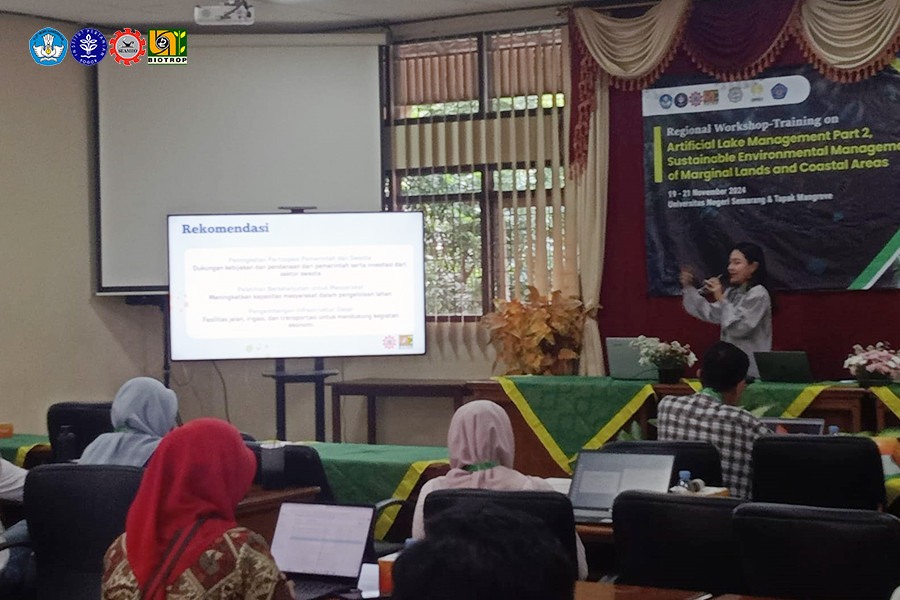SEAMEO BIOTROP successfully organized the “Regional Workshop-Training on Artificial Lake Management Part 2: Sustainable Environmental Management of Marginal Lands and Coastal Areas” from 19 to 21 November 2024, in collaboration with Universitas Negeri Semarang (UNNES) and Aurora State College of Technology, Philippines. The hybrid event brought together 126 participants from Indonesia, the Philippines, and Cambodia, comprising students, lecturers, researchers, and practitioners across sectors.
The training aimed to enhance regional capacity in managing degraded and marginal landscapes, focusing on practical and sustainable solutions including organic rehabilitation, blue carbon initiatives, bioenergy, and spatial technology applications. A total of 14 participants took part offline at UNNES and Tapak Mangrove Field Site in Semarang, where hands-on sessions such as compost making, spatial mapping, and sustainable aquaculture techniques were demonstrated.
Evaluation results indicate overwhelming success, with 98% of participants affirming the quality of discussions and more than 90% of respondents rating the materials as highly relevant. The training also included pre- and post-tests showing significant knowledge gains, and all topics—from invasive species to socio-economic soft skills—achieved full comprehension targets.
Key speakers included experts from SEAMEO BIOTROP, IPB University, and UNNES, who presented themes ranging from post-mining land recovery to blue economy practices through mangrove management. Notable presentations addressed the critical role of bioenergy in underutilized lands, invasive alien plant mitigation, and ecosystem approaches to aquaculture.
The field visit to Tapak Mangrove provided experiential learning on coastal conservation practices, reinforcing the importance of integrating community-based efforts with environmental science. Workshop coordinator Risa Rosita emphasized that these methods are designed to support the Sustainable Development Goals (SDGs), particularly SDG 13, 14, and 15, which advocate for climate action, life below water, and life on land.
SEAMEO BIOTROP continues to reaffirm its commitment to environmental stewardship and sustainable development through such regional collaborations. The workshop concluded with a strong message on the need for continuous innovation, policy engagement, and stakeholder collaboration to ensure long-term ecological and economic resilience in Southeast Asia’s most vulnerable landscapes.
The training aimed to enhance regional capacity in managing degraded and marginal landscapes, focusing on practical and sustainable solutions including organic rehabilitation, blue carbon initiatives, bioenergy, and spatial technology applications. A total of 14 participants took part offline at UNNES and Tapak Mangrove Field Site in Semarang, where hands-on sessions such as compost making, spatial mapping, and sustainable aquaculture techniques were demonstrated.
Evaluation results indicate overwhelming success, with 98% of participants affirming the quality of discussions and more than 90% of respondents rating the materials as highly relevant. The training also included pre- and post-tests showing significant knowledge gains, and all topics—from invasive species to socio-economic soft skills—achieved full comprehension targets.
Key speakers included experts from SEAMEO BIOTROP, IPB University, and UNNES, who presented themes ranging from post-mining land recovery to blue economy practices through mangrove management. Notable presentations addressed the critical role of bioenergy in underutilized lands, invasive alien plant mitigation, and ecosystem approaches to aquaculture.
The field visit to Tapak Mangrove provided experiential learning on coastal conservation practices, reinforcing the importance of integrating community-based efforts with environmental science. Workshop coordinator Risa Rosita emphasized that these methods are designed to support the Sustainable Development Goals (SDGs), particularly SDG 13, 14, and 15, which advocate for climate action, life below water, and life on land.
SEAMEO BIOTROP continues to reaffirm its commitment to environmental stewardship and sustainable development through such regional collaborations. The workshop concluded with a strong message on the need for continuous innovation, policy engagement, and stakeholder collaboration to ensure long-term ecological and economic resilience in Southeast Asia’s most vulnerable landscapes.
 Tuesday, 01 July 2025 on 4:15pm
Tuesday, 01 July 2025 on 4:15pm
